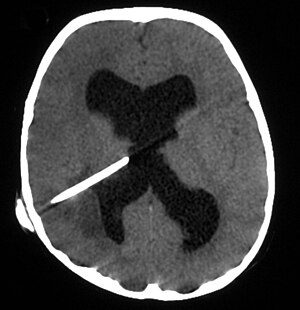Brain abscess
| Brain abscess | |
|---|---|
 |
|
| Brain abscess in a person with CSF shunt. | |
| Classification and external resources | |
| ICD-9-CM | 324.0 |
| DiseasesDB | 6880 |
| MedlinePlus | 000783 |
| MeSH | D001922 |
Brain abscess (or cerebral abscess) is an abscess caused by inflammation and collection of infected material, coming from local (ear infection, dental abscess, infection of paranasal sinuses, infection of the mastoid air cells of the temporal bone, epidural abscess) or remote (lung, heart, kidney etc.) infectious sources, within the brain tissue. The infection may also be introduced through a skull fracture following a head trauma or surgical procedures. Brain abscess is usually associated with congenital heart disease in young children. It may occur at any age but is most frequent in the third decade of life.
Fever, headache, and neurological problems, while classic, only occur in 20% of people.
The symptoms of brain abscess are caused by a combination of increased intracranial pressure due to a space-occupying lesion (headache, vomiting, confusion, coma), infection (fever, fatigue etc.) and focal neurologic brain tissue damage (hemiparesis, aphasia etc.). The most frequent presenting symptoms are headache, drowsiness, confusion, seizures, hemiparesis or speech difficulties together with fever with a rapidly progressive course. The symptoms and findings depend largely on the specific location of the abscess in the brain. An abscess in the cerebellum, for instance, may cause additional complaints as a result of brain stem compression and hydrocephalus. Neurological examination may reveal a stiff neck in occasional cases (erroneously suggesting meningitis). The famous triad of fever, headache and focal neurologic findings are highly suggestive of brain abscess.
...
Wikipedia
